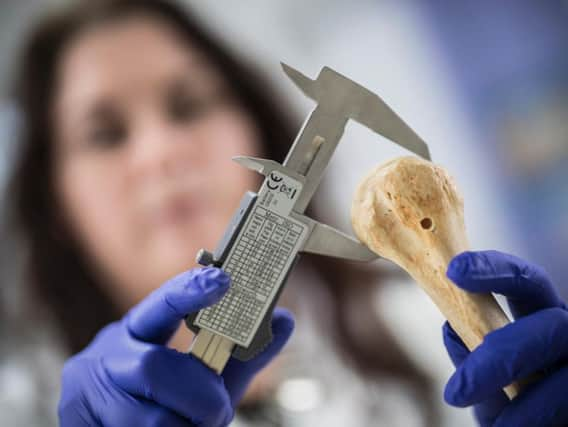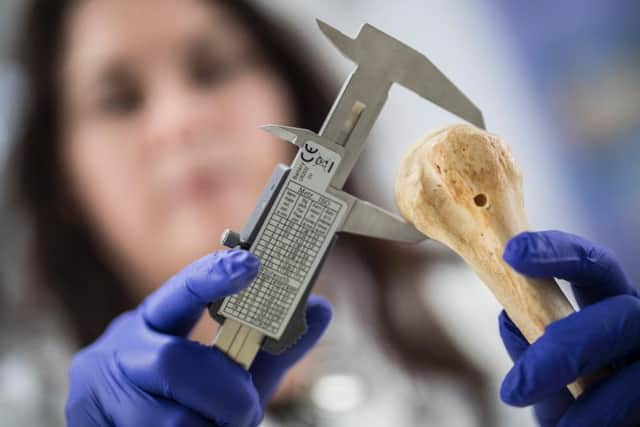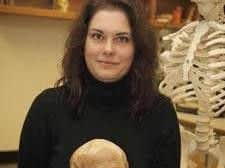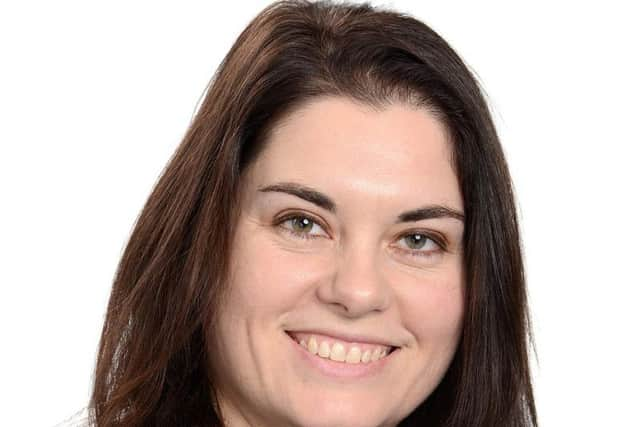Meet the scientist in talks to start a British 'body farm'


Dead bodies hanging from trees, floating in ponds and decomposing in car boots and litter bins - it all sounds like a particularly gruesome horror movie but a “body farm” designed to help police investigate missing person cases and murders may soon be on its way to the UK, if one Yorkshire academic gets her way.
Doctor Anna Williams, a forensic anthropologist at Huddersfield University, has been involved in talks with the Human Tissue Authority (HTA) about the feasibility of the UK following in the lead of America and Australia and setting up the country’s first human taphonomy facility.
Advertisement
Hide AdAdvertisement
Hide AdWhile previous attempts in 2010 to establish such a centre on a 30-acre site in Lincolnshire failed to come to fruition, Dr Williams says discussions are now at a more advanced stage with public perception to such an idea softening.


“People are becoming more aware of it and that it can be seen as not something that is gruesome and the stuff of horror movies but instead something that benefits society, investigations of crime and the pursuit of justice. It can help solve murder cases and find missing people,” she says.
Earlier this year, Dr Williams and students at the University of Huddersfield set up HTF-4-UK, a project designed to push for the introduction of a British human taphonomy facility and conducting surveys to ascertain public opinion.
Along with John Cassella, a professor of forensic science education at Staffordshire University, she has been involved in preliminary talks with the HTA, a regulator which is an executive agency of the Department of Health, about the feasibility of the body having oversight of such a facility.
Advertisement
Hide AdAdvertisement
Hide Ad“Talks are at a very early stage. We need to be clear that we don’t know whether the human taphonomy facility is going to be set up. The HTA is just thinking about how they would regulate it if it was. We would just suggest the UK needs a human taphonomy facility. We have been to talk to the HTA about whether they would be interested in regulating it because we think it needs regulating.”


No location is proposed for the site as yet but Dr Williams says that should it come to pass, the centre would be able to play a useful role in solving crimes and helping bereaved families get justice.
“I think it would make a massive difference. We can use the data that comes out of American or Australian facilities but the climate is different, the scavengers and insects which affect bodies are different. We are missing the information on how bodies decompose in our climate. There are so many things it can help with such as being more accurate about how long a body has been dead, things like the degradation of DNA in our environments.
“We might be able to improve how we identify somebody, we can use the facility to improve the training of cadaver dogs which currently train using pigs. At the moment, they are trained on pigs and we are expecting them to find humans. It could also help to improve the strength of evidence in criminal cases.”
Advertisement
Hide AdAdvertisement
Hide AdThe additional knowledge gleaned from having such information available for British conditions may have assisted investigators in missing person cases like Milly Dowler and April Jones.


Dr Williams says: “These techniques will improve the techniques we have at our disposal for finding bodies and for working out what happened to them.”
The first human taphonomy facility was opened in 1981 in Tennessee by a forensic anthropologist Bill Bass. His decision to set up the site was partly inspired by a case in which he was asked to help identify a dead body which he originally identified as passing away a few months before - but turned out to be the corpse of a Civil War colonel who had actually died more than a century earlier.
After persuading the University of Tennessee of the need for a research facility that would better aid understanding around the decomposition of bodies, the site was known as the Anthropological Research Facility.
Advertisement
Hide AdAdvertisement
Hide AdInterest in the activities at the facility - and a memorable unofficial new name for the site - arrived in 1994 when author Patricia Cornwell published The Body Farm, the story of an FBI agent investigating a girl’s murder who turns to a “clandestine research facility in Tennessee known as The Body Farm" to help solve the case.


Since then, a further five such body farms have been opened in the US by universities, as well as one in Australia. Another is planned to open soon in the Netherlands.
Dr Williams says the first facility that will study decomposition effects in cold weather conditions is due to open soon in northern Michigan in the US.
She says she has not managed to visit one of the sites herself, but the existing facilities all vary in size and scope, with some dealing with more than 150 bodies at a time.
Advertisement
Hide AdAdvertisement
Hide Ad“It is not obvious from the outside what they are. If you went to visit, you would see bodies in various states of decomposition, some of them on the surface, some buried. In Tennessee, they have them sitting in trees or I believe some are hanging from trees.”
Dr Williams says people choose to donate their bodies for the same reason others give them to medical science. “They want to help and give something back. With forensic science, in recent years a lot of TV shows and films have captured the public’s imagination - people realise that forensic science has a powerful value to society.
“With these facilities, I believe that more people may be able to donate than can donate to medical science as they turn away people if they have certain conditions. That may not be the case with a forensic facility.”


She says that if a British facility is established, it would be down to the HTA to decide on what happens with bodies when their use is over. “I imagine the donor would decide before they died what they wanted to happen to their body. They would have a range of options - families could have the body back after the research period for burial or cremation or perhaps they could be used as skeletons for teaching purposes.”
Advertisement
Hide AdAdvertisement
Hide AdDr Williams is far from the only proponent of the importance of body farms in this country. Stephen Fry was so impressed with the Tennessee facility he visited as part of his 2008 BBC documentary series Stephen Fry in America that he said he would consider donating his body to it.
Fry told viewers: “This garden of earthly remains might at first glance seem rather a grisly and morbid place to be but actually I think it should fill one with a kind of optimism because it is being used for extraordinarily good purposes to catch wicked people and to ease the burden of suffering for grieving people. I might genuinely consider leaving my body to such an institution, it might as well do some good.”
Facility would be strictly regulated
The Human Tissue Authority says it is in regular contact with Dr Williams about the idea of establishing a regulation regime for a potential facility.
A spokesman for the HTA said: “The Human Tissue Authority, with the Forensic Pathology Unit of the Home Office, is considering how to bring human taphonomy within the scope of the HTA’s regulatory remit, or another suitable regulatory system.
Advertisement
Hide AdAdvertisement
Hide Ad“Our aim is to ensure that - were such a facility to be established in the UK - the consent of the individuals who donate their bodies would have primacy, and the activities taking place would be subject to the same standards as those required in other areas of research where human tissue is used.”